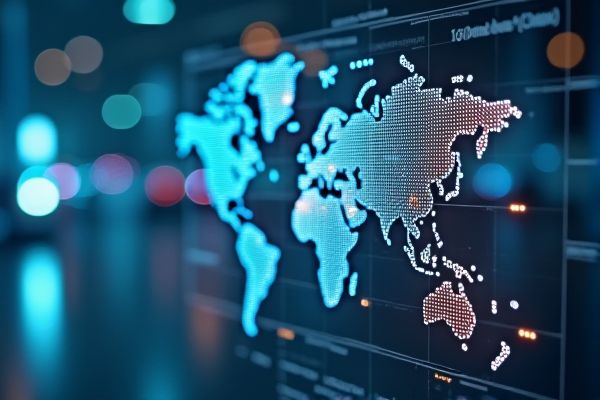
AI enhances customer experiences in the travel industry through personalized recommendations and tailored marketing strategies. Chatbots and virtual assistants provide real-time support, answering queries and helping travelers make informed decisions. Predictive analytics improve pricing strategies by analyzing market trends and consumer behavior, resulting in better deals for customers. Automated systems streamline operational processes, enabling travel companies to efficiently manage bookings and customer inquiries.
AI usage in travel industry
Personalized travel recommendations
The travel industry increasingly relies on AI for personalized travel recommendations. By analyzing customer preferences and past behaviors, companies like Expedia can tailor suggestions for destinations and activities. This technology enhances customer satisfaction and can lead to increased bookings. Potential advantages include improved customer loyalty and streamlined user experiences.
Predictive analytics for demand forecasting
AI in the travel industry facilitates predictive analytics for demand forecasting, allowing companies to anticipate customer needs and adjust offerings accordingly. For instance, a travel agency might utilize machine learning algorithms to analyze historical booking data, enhancing their pricing strategies. By leveraging these insights, businesses can optimize resource allocation, improving operational efficiency. This proactive approach can significantly increase profitability and customer satisfaction in a competitive market.
Real-time customer service chatbots
Real-time customer service chatbots have the potential to significantly enhance user experience in the travel industry. By providing instant assistance, these AI-driven tools can resolve common travel inquiries, such as flight status and booking changes for institutions like airlines or travel agencies. This immediate support may lead to higher customer satisfaction and increased loyalty. As technology advances, the adoption of such chatbots could create competitive advantages for businesses looking to differentiate themselves in a crowded market.
Dynamic pricing optimization
AI can enhance dynamic pricing optimization in the travel industry by analyzing real-time data to adjust prices based on demand and competition. For example, airlines like Delta Air Lines leverage AI algorithms to predict passenger behavior and set optimal fare prices. This approach can lead to increased revenue and improved customer satisfaction by offering competitive rates. Companies that implement these strategies may find a significant advantage in maximizing profitability while meeting traveler needs effectively.
Enhanced travel safety and security
AI can significantly improve travel safety and security by using predictive analytics to identify potential risks. For example, airlines like Delta are utilizing AI to monitor passenger movements and identify unusual behavior patterns. This technology may help to enhance passenger screening and reduce response times in emergency situations. The integration of AI in security measures could lead to a more secure travel experience, giving travelers greater peace of mind.
Virtual travel assistants
Virtual travel assistants can enhance customer experiences by providing personalized recommendations based on user preferences. AI algorithms can analyze vast datasets from platforms like Expedia to optimize travel itineraries. This technology offers the possibility of real-time assistance, making it easier for travelers to adjust plans spontaneously. The ability to predict trends could give businesses an advantage in marketing strategies and service offerings.
Image recognition for location-based suggestions
Image recognition technology in the travel industry can enhance user experience by providing location-based suggestions. For instance, an application might analyze photos taken at a spot to recommend nearby attractions or restaurants. This personalized approach can increase customer engagement and improve the likelihood of exploring new destinations. With companies like TripAdvisor incorporating such features, there is significant potential for growth in travel-oriented AI innovations.
Automated itinerary planning
Automated itinerary planning in the travel industry offers a streamlined approach for both travelers and agents. By leveraging AI technologies, such as machine learning algorithms, agencies can create personalized itineraries tailored to individual preferences and budgets. This method could increase customer satisfaction and enhance the efficiency of operations at companies like Expedia. The potential for reduced planning time and improved travel experiences presents an advantageous opportunity for stakeholders in the tourism sector.
Improved customer feedback analysis
AI can significantly enhance customer feedback analysis in the travel industry by processing large volumes of data efficiently. Machine learning algorithms can identify trends and sentiments from reviews, helping companies like Booking.com tailor their services to meet traveler preferences. This capability leads to more informed decision-making, which can improve customer satisfaction and loyalty. As travel companies adopt these technologies, they stand to gain a competitive advantage by quickly responding to customer needs and expectations.
Language translation for smoother communication
AI technology in the travel industry enhances the efficiency of language translation, facilitating smoother communication between travelers and service providers. This allows for better customer service in hotels, airlines, and travel agencies. The use of AI-driven translation tools can minimize misunderstandings, improving the overall travel experience. For example, a traveler using an AI translation app can easily communicate with hotel staff in a foreign country.
 techknowy.com
techknowy.com